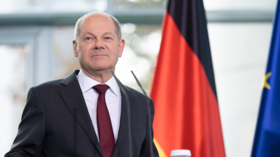Most Germans believe Scholz is not up to the job – poll

Most Germans think Olaf Scholz is “overwhelmed” with his duties as chancellor, according to a survey by the country’s INSA polling agency. More than half of respondents – 55% – believe he is not ready to handle the challenges the nation is facing, the Bild tabloid, which commissioned the poll, reported on Monday.
In the context of the Ukraine conflict and energy crisis, 24% of Germans feel sure Scholz is not up to the challenge of leading the government, while 31% also “rather agree” with such an assessment. A minority of 37% believe Scholz is able to effectively lead the nation through the current difficulties.
If Germans were able to vote for a chancellor directly, only 27% would pick Scholz, the survey found. However, Friedrich Merz, the leader of the biggest opposition party – the Christian Democratic Union (CDU) –would garner even less support, with only 15% of Germans willing to vote for him. Almost a half of respondents would choose neither of the two candidates.
Another INSA poll conducted back in September also showed a low level of support for the chancellor. At the time, nearly 50% of Germans said he was unfit for office. Other government ministers also demonstrated low approval ratings. Defense Minister Christine Lambrecht was the worst performer at that time, with a public support level of 18%.
The findings come at a time when Germany is grappling with an energy shortage, partly caused by the EU’s drive to give up Russian energy exports in response to Moscow’s military operation in Ukraine. The crisis has driven up oil and gas prices, and now Germany faces what Bild describes as a potentially “chilling winter,” with people advised to save energy by lowering the heating levels in their homes.
Military aid for Ukraine is also a contentious topic for the German government. Scholz’s cabinet has been repeatedly criticized by both Kiev and the chancellor’s own coalition partners for supposedly not doing enough to help Ukraine, and being reluctant to supply it with heavier weapons such as Leopard 1 tanks.
Some German celebrities and intellectuals have called on the government to stop sending arms to Ukraine altogether, warning of the risks of an escalation and prolonging the suffering of those caught up in the conflict.













